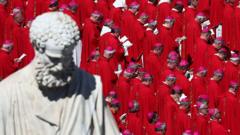As 133 cardinals prepare to enter a lockdown for the conclave to elect a new Pope following Francis’ death, stringent measures are in place to ensure absolute secrecy and minimize outside influence in a process steeped in tradition.
Secrets and Sacraments: The Intricacies of the Papal Conclave

Secrets and Sacraments: The Intricacies of the Papal Conclave
A behind-the-scenes look at the extraordinary precautions and rituals shaping the election of the next Pope.
In a historic and secretive process, 133 cardinals will convene in the Sistine Chapel this Wednesday for the highly anticipated conclave, tasked with selecting a successor to Pope Francis. As witnesses to one of the most discreet elections globally, each participating cardinal has taken an oath, pledging to maintain total secrecy for life about the proceedings. This extends to all Vatican personnel present during the conclave, including medical staff and dining employees, all of whom also commit to "absolute and perpetual secrecy."
The Vatican's commitment to confidentiality is evident through meticulous security protocols. The Sistine Chapel and guest accommodations will undergo thorough inspections to eliminate potential surveillance devices. Electronic interference tactics, including the use of jammers to block cell phone and Wi-Fi signals, underscore the Vatican’s resolve to maintain isolation during this event. John Allen, editor of the Crux news site, emphasizes this stringent approach, asserting, "The Vatican takes the idea of isolation extremely seriously."
Lockdown encompasses not only the preservation of confidential votes but also aims to safeguard against external influences during this monumental decision-making process. The cardinals are required to check in all electronic gadgets, ensuring that they are devoid of distractions or outside communications. Inescapably confined, they are prohibited from accessing newspapers, televisions, or radios. “You can’t even open the windows,” states Monsignor Paolo de Nicolo, former head of the Papal household for three decades.
The measures extend as far as strict vetting for all staff members, reinforcing the integrity and confidentiality of the cardinal electors. Communication among the cardinals is tightly regulated, with walkie-talkies reserved exclusively for emergencies, ensuring a total lack of external chatter. Noncompliance with the oath to maintain secrecy could result in excommunication, with Monsignor de Nicolo noting that nobody dares to breach these commitments.
Conversely, the approach to the conclave’s lead-up has ignited a media frenzy, with journalists on a manhunt for "cardinal sightings." The atmosphere is buzzing as speculation swirls about whom the cardinals may select as the next pontiff. Various media outlets have closely monitored the cardinals' movements, while local eateries report sightings of these 'princes of the church' before they enter lockdown. Despite their attempts at secrecy, the cardinals are frequently bombarded by reporters eager for any hint of insider information.
As the world waits, debates continue to flourish regarding the candidates. The outcome of this conclave may influence global issues far beyond ecclesiastical affairs, aiming to reshape the Catholic Church’s trajectory amid modern challenges. However, this very influence complicates the election, with various factions attempting to sway opinions through public discourse.
Despite this, insiders such as John Allen suggest that a purer motivation for the cardinals will prevail, which he believes will ultimately center around individual convictions rather than imposed political pressures. As the cardinals prepare to barricade themselves from the outside world, their interactions will determine the next leader of the Catholic Church, shaping the institutional response to pressing global matters for years to come.
The Vatican's commitment to confidentiality is evident through meticulous security protocols. The Sistine Chapel and guest accommodations will undergo thorough inspections to eliminate potential surveillance devices. Electronic interference tactics, including the use of jammers to block cell phone and Wi-Fi signals, underscore the Vatican’s resolve to maintain isolation during this event. John Allen, editor of the Crux news site, emphasizes this stringent approach, asserting, "The Vatican takes the idea of isolation extremely seriously."
Lockdown encompasses not only the preservation of confidential votes but also aims to safeguard against external influences during this monumental decision-making process. The cardinals are required to check in all electronic gadgets, ensuring that they are devoid of distractions or outside communications. Inescapably confined, they are prohibited from accessing newspapers, televisions, or radios. “You can’t even open the windows,” states Monsignor Paolo de Nicolo, former head of the Papal household for three decades.
The measures extend as far as strict vetting for all staff members, reinforcing the integrity and confidentiality of the cardinal electors. Communication among the cardinals is tightly regulated, with walkie-talkies reserved exclusively for emergencies, ensuring a total lack of external chatter. Noncompliance with the oath to maintain secrecy could result in excommunication, with Monsignor de Nicolo noting that nobody dares to breach these commitments.
Conversely, the approach to the conclave’s lead-up has ignited a media frenzy, with journalists on a manhunt for "cardinal sightings." The atmosphere is buzzing as speculation swirls about whom the cardinals may select as the next pontiff. Various media outlets have closely monitored the cardinals' movements, while local eateries report sightings of these 'princes of the church' before they enter lockdown. Despite their attempts at secrecy, the cardinals are frequently bombarded by reporters eager for any hint of insider information.
As the world waits, debates continue to flourish regarding the candidates. The outcome of this conclave may influence global issues far beyond ecclesiastical affairs, aiming to reshape the Catholic Church’s trajectory amid modern challenges. However, this very influence complicates the election, with various factions attempting to sway opinions through public discourse.
Despite this, insiders such as John Allen suggest that a purer motivation for the cardinals will prevail, which he believes will ultimately center around individual convictions rather than imposed political pressures. As the cardinals prepare to barricade themselves from the outside world, their interactions will determine the next leader of the Catholic Church, shaping the institutional response to pressing global matters for years to come.



















